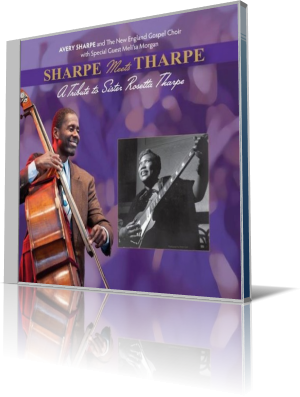|



Among the superstitious, jazz is considered “the devil’s music.” Avery
Sharpe joins the chorus of musicians who defy that line of thinking by
showing that jazz, like any other genre of music, can be used for
inspiration and to praise God. Sharpe Meets Tharpe: A Tribute to
Sister Rosetta Tharpe (JKNM Records, 2016) presents the acclaimed
bassist with The New England Gospel Choir and special guest Meli’sa
Morgan.
Sharpe plays double bass, six-string electric bass and uses his voice.
Meli’sa Morgan is lead vocalist on the songs that have lyrics. The other
musicians are Charles Neville, tenor sax with solos on “Shout Sister
Shout” and “Miss Nubin”; Michael King, piano and Hammond B-3 organ; Cory
Cox, drums; Charles Langford, tenor and soprano saxophones; Jeremy
Turgeon, trumpet; and James Messbauer, trombone. The New England Gospel
Choir consists of Kevin Sharpe, director, tenor and bass; sopranos
Heather Lord, Tania Greene and Shaina Paris; altos Wanda Rivera, Sofia
Rivera and Linda Turner; tenor Heshima Moja, who leads on “Lonesome
Road”; bass Robert Rivera; and rehearsal pianist Michele Feldheim.
“This Train,” a traditional spiritual, opens the set. Sharpe and Cox lay
down the groove as the horn section warms up. Morgan sings in a style
similar to Mavis Staples, blending gospel spirituality with soulful
toning. King takes point during the middle break, with the choir adding
a haunting, ethereal element. Sharpe then licks his chops on the
electric, striking a series of high notes that make you wonder if it’s a
bass or a guitar.
“Spiritual Dilemma” is one of two Sharpe-penned instrumentals. It has a
finger-snapping beat led by the bassist. After piano and drums engage,
the horns blend for a bouncy, swinging lead. A series of solos follow,
in order: trombone, trumpet, piano, bass, tenor sax. Cox gets to show
his chops during a call and response with the horns during the closing
sequence.
Sharpe was raised in the Church of God in Christ, where he played
electric bass. He later began playing jazz with a double bass,
performing with such icons as McCoy Tyner and Wynton Marsalis. In the
accompanying literature, Sharpe acknowledges there was a divide between
sacred music and secular music. Sister Rosetta Tharpe was among the
first to be successful with both styles. Sharpe Meets Tharpe
explores songs that Tharpe popularized, with two original tunes in her
honor.

|


